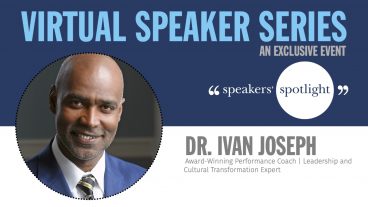With workplaces changing at a rapid pace, the management and leadership styles of the past no longer serve the workplace of the future. Leading an organization through transformational change demands transformational leadership. Yassmin Abdel-Magied helps leaders and organizations around the world bridge that gap.
Yassmin is an internationally renowned speaker on leadership and unconscious bias. Earlier this year, she shared her 2024 leadership trend to watch as part of our three-part series exploring the leadership, workplace culture, and AI/Tech trends shaping the year ahead. She explained why we’ll see an increased demand for transformative leadership in 2024:
While the lockdowns ended over two years ago, and the impact of the summer of Black Lives Matter is no longer as evident, the change in the social fabric is permanent. Combine this with a new generation entering the workforce, with expectations and desires quite unlike any generation before, and we have a landscape that is full of uncertainty, political landmines, and emotional trapdoors galore.
In times like these, there is a desperate desire for leadership that is brave, courageous, and transformative. This is not a time for “managing”, for doing things how we have “always done them”, simply out of habit or from a place of fear. This is a time to invite new possibility into the tent, experiment, and move into a place of strength. Leading from a place of strength, even when one is afraid — that truly is transformative.
Building on this trend, we asked Yassmin to share more insight into transformative leadership — what it is, why it’s needed now more than ever, and how people can make the shift from traditional to transformative leadership to meet the needs of today’s workforce.
What is a Transformative Leader?
A transformative leader is somebody who can take an organization through a period of change — big or small — so that not only the organization changes but the people who work there are transformed.
There are five key characteristics that transformative leaders have, Yassmin says, all of which are vital to any transformation:
- Authenticity
- Self-awareness
- Humility
- Collaboration
- Interdependence
In her keynote “Leadership Through Change”, Yassmin shows audiences how they can build and reflect these characteristics in their own lives and use them as tools to lead transformative change.
Why is Transformational Leadership Needed Now More Than Ever?
As Yassmin mentions in her trend, years of extreme change and uncertainty has permanently altered our social fabric and the way in which we work. This combined with a new generation entering the workforce has made it clear, she says, that the management and the leadership skills of the past are not entirely fit for the workplaces of the 21st century.
Right now, we’re seeing a tension in workplaces as some leaders and organizations are asking their employees to forget the last few years of extreme change and uncertainty happened and to just return to work as it was five years ago. This rigidity does not sit well with today’s employees, Yassmin said, especially new employees. It tells them that you’re not responsive, you’re not innovative, that you have a fixed idea of what the world should look like.
Success today and in the future of work demands a more agile approach, Yassmin added, and I mean agile in the truest sense of the word — being nimble and open-minded. This is where transformative leadership comes in. Leading with authenticity, self-awareness, humility, collaboration, and interdependence fosters that individual and organizational agility needed to augment the skills of the past with the skills needed for the future.
Common Mistakes To Avoid
There are three common mistakes leaders make when dealing with transformational change.
1. Leaders assume people want or expect them to have all the answers
This is one of the most common mistakes leaders make, Yassmin said. Your team doesn’t expect you to have all the answers, but they do expect you to have a sense of humility and collaboration.
Feeling like you have to have all the answers can put you on the defense, which distances people from you. When going through transformational change, you want to do the opposite of that. If you lead change through the lens of collaboration and interdependence, if you’re honest about what you do and do not know, it demonstrates to your team that you’re in this together. It fosters trust, and when you can trust each other, you can change together.
2. Leaders Assume People Will Automatically Know What to Do
Another mistake leaders make is to approach change as a directive versus a collaborative process, Yassmin says. Again, collaboration is such a key part of transformation! Transformative leaders still have a vision of where they want to go, but they don’t expect their team to know how to get there on their own.
3. Leaders Assume Change Will Happen Quickly
No matter how big or how small the change is, it’s going to be messy, it’s going to be very human, Yassmin said. Too often, leaders walk in assuming change will happen quickly. This sets the stage for failure. Have a long-term goal and set some touchpoints or values to indicate that you’re moving forward, but practice agility in executing that plan. You need to find ways to measure change that doesn’t depend on the human process being linear or quick, Yassmin added.
The Friction of Change
Being a transformative leader doesn’t mean you’re always going to get it right, Yassmin said. With any change comes friction. You are going to get pushback, but this doesn’t mean you should stop. Instead, see it as reinforcing the importance of why you’re doing what you’re doing.
If something doesn’t work, try a different approach, while always keeping those communication channels open to allow different voices to contribute.
In her popular keynote, “Leadership Through Change”, Yassmin Abdel-Magied expertly combines personal experience and research to inform leaders on the tools of transformative leadership, the common mistakes leaders can make, and how to be just and empowering leaders for the 21st century.
Contact us to learn more about Yassmin and how she can help your organization thrive through change.




